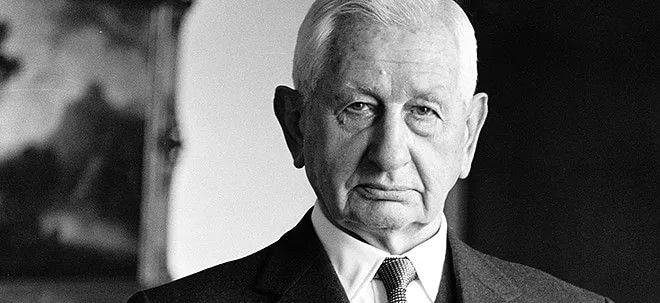When he died, he left behind an industrial empire: Who is Friedrich Flick?
His wealth increased during the Nazi period: within the framework of the "Aryanization" of the German economy, he bought companies that were no longer run by Jewish citizens very cheaply. He assumed control of mining companies in all European countries occupied by Germany during the Second World War.

Flick, who founded a mining giant in the 30s and 40s, profited from the war and the policies of the National Socialists. Flick, who was convicted as a war criminal after World War II, turned his large company into the largest industrial enterprise in the Federal Republic of Germany after 1950 and rose to the position of the richest man in his country.
He was born in Ernsdorf, in the district of Siegen, as the son of a father who was engaged in farming and wood trade. After graduating from high school in Siegen, he did an internship with a merchant in Weidenau. After completing his one-year military service in Kassel, he studied at the Higher Trade School in Cologne.
Friedrich Flick (10 July 1883 – 20 July 1972) was a German industrialist and convicted Nazi war criminal. After the Second World War, he reconstituted his businesses, becoming the richest person in West Germany, and one of the richest people in the world, at the time of his death in 1972.
Flick, who started his career as a signature officer at the Siegerlaendische Bremerhütte company at the age of 24, took part in the board of directors of the Eisenindustrie zu Menden und Schwerte AG mining company in Dortmund in 1913.
During the First World War, with his personal income from scrap iron trading, he purchased most of the shares of the Chariottenhütte mining company in Niederschelden (Siegen district), on the board of which he had served since 1915.
Two years later, 34-year-old Flick was appointed general manager of this company and began to steadily expand its businesses in the fields of steel and coal. In the following years, Flick acquired the majority of shares in many iron (casting) enterprises throughout Germany, especially in Upper Silesia.
Industrialist Flick, who had very little personal capital, took advantage of the rapidly increasing inflation to liquidate his financing loan debts. Apart from this, Flick was very good at gaining financial advantages by complicating business areas.
In 1929, he gathered all his businesses together under the name Mitteldeutsche Stahlwerke AG (Central Germany Steel Works Joint Stock Company) and became the company's largest shareholder and chairman of the board. Flick was a member of the politically royalist DNVP (National German People's Party) until the late 20s. He joined Hitler's NSDAP (National Socialist German Workers' Party) in the early 30s, and this party received financial support from its member Flick in the following years. Thanks to his good relations with the political administration, Flick was able to turn the large steel company into an empire in the 30s and 40s.
He incorporated into Friedrich Flick KG, the holding he founded in 1937, companies that were no longer managed by Jewish citizens and were closed down very cheaply within the framework of the "Aryanization" of the German economy. During World War II, Flick assumed control of mining companies in all European countries occupied by Germany.
Flick, who was also the director of the defense economy and a member of the state blacksmithing agency presidency (after 1942), was able to further increase his financial wealth (about half a billion dollars in 1945) through the extensive steel production of forced laborers brought from prisons and concentration camps and the armament industry.
He was arrested by the American Allies in June 1945, and two years later in Nuremberg, he was sentenced to seven years in prison (in Landsberg) as a war criminal in the Flick case (primarily for his exploitation of forced laborers). With approximately four years left to complete his sentence, 67-year-old Flick was released in August 1950.
Since his wealth was not confiscated but placed in trust, Flick was able to establish a new group of companies based on a quarter of his holdings in the early 50s. Flick, who had to sell his mining companies to a large extent upon the instructions of the Allies, was able to sell especially the coal mines at good prices and henceforth turned his attention primarily to the manufacturing industry.
After purchasing shares in the automobile industry (e.g. Daimler-Benz) and the paper and chemical industry (Feldmühle, Dynamit Nobel AG), he also became a partner in companies from various branches, such as Buderus-Eisenwerke Wetzlar (iron works), Rüstungskonzern Krauss-Maffai München (arms company). At the beginning of the 60s, Flick began to train his youngest son, Friedrich Karl Flick, to succeed him. Many other members of his family also served on the company's board of directors.
Flick, who received the Federal Medal of Merit in 1963, died in 1972 at the age of 89. When he died, he left the largest German industrial empire with approximately 330 enterprises, 300,000 employees, and an annual turnover of approximately 18 billion. His personal wealth was around 6 billion DM. 13 years after the death of the company founder, his son sold the holding to Deutsche Bank.
